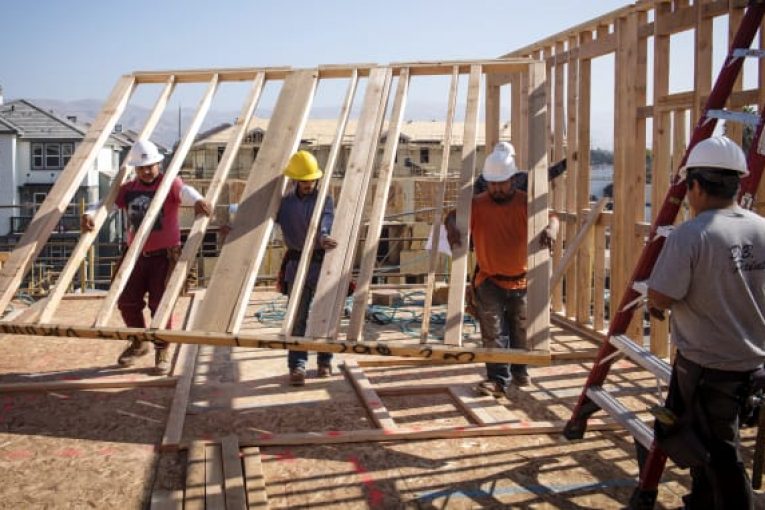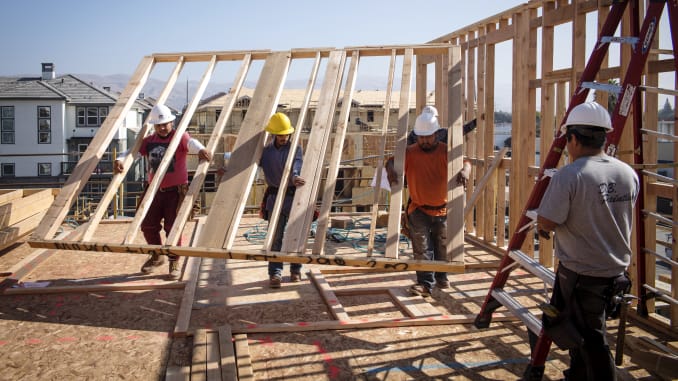

Last week I was asked the following question on SB 50: “There seems to be a ‘dearth’ of articles on here, regarding the views of social justice/equity groups toward SB 50. Why is that, given David’s apparent interest in that subject at other times?”
What I find interesting is that a lot of people seem to believe I supported SB 50. The truth is – as I have expressed a number of times previously – I didn’t support SB 50. I didn’t oppose SB 50 either. I believe the idea behind it has some merit. And most fundamentally I believe we have a housing shortage and I don’t see a really good alternative put on the table at this point that would increase housing production.
The groups that are kind of intriguing to me are those who generally support housing but opposed SB 50. One group – Housing is a Human Right – saw SB 50 as “a handout to developers and the real estate industry that turbocharges gentrification in our cities without solving our housing affordability crisis. SB 50 does little to address the housing affordability crisis, will fuel further speculation without building the kind of housing we need, and will put working- and middle-class communities (especially of color) at risk of displacement.”
I’ve definitely raised affordability and concerns about gentrification.
Here is what I liked about SB 50.
The LA Times editorial board put it this way: “SB 50 is bold, to be sure; it would herald a dramatic, but ultimately necessary transition toward greater density in California.”
What I like about this bill is that it addressed the issue of housing in a way that would encourage densification rather than building more housing on peripheral land. For those arguing that it  would not prevent such building, I agree it would not. But what it does do is clears the hurdles toward building density near transit and jobs.
would not prevent such building, I agree it would not. But what it does do is clears the hurdles toward building density near transit and jobs.
It allows for taller buildings and more homes in places where people can better connect their homes to their jobs.
There were problems with this approach as well. One is that it would have largely prevented local land use discretion over the type of housing built.
Another concern that many had was that there were not strict enough affordability controls on this. The 2020 version of the bill called for between 15 and 25 percent affordability, but with smaller developments would not have required the affordability to be on-site.
These problems led to concerns about gentrification as well – tearing down lower income housing and displacing current residents with higher income housing.
When these arguments about enriching developers are made by groups normally opposing new housing, we can question their motivation. When it comes from groups that generally support building new housing, then I think we have to look at it more closely.
The problem is that right now, in the absence of SB 50, we have the status quo and no viable proposal on the table.
As the SF Chronicle pointed out last week: “Although California has the nation’s least affordable housing markets, a quarter of its homeless population and fewer homes per capita than nearly any other state, the Senate recently whiffed its third attempt to revive persistently anemic housing production.”
The Chronicle disagrees with the notion that building this housing would “[s]peed gentrification of low-income areas.” They argue, that right now, they are “bearing the brunt of demand because wealthier communities are free to block development.”
The Chronicle noted that among the opponents of SB 50 were three Bay Area Democrats: “Jerry Hill of San Mateo, Steve Glazer of Orinda and Bill Dodd of Napa.”
From the Chronicle’s perspective: “Given the depth and consequences of the housing shortage in the places these men represent, their votes defy justification. They and Gov. Gavin Newsom, who despite his pledge to dramatically increase housing production did not endorse SB50, should feel enormous pressure to produce an alternative before the legislative session expires.”
This is the point I have made several times before – they have succeeded in killing SB 50. The reality now is that we are in the exact same place as before. Nothing has changed and the housing crisis remains.
I view housing as a social justice issue itself. We end up in a situation where we are reliant on developers to build new housing, and the people hurt by the housing shortage are low income people and the homeless, not the wealthy, not the developers. So the question is – how do we figure out a way to produce more housing?
I have put forward the idea of a modified version of SB 50 where you simply require local communities to meet their eight-year RHNA (Regional Housing Needs Allocation) goals – with the provision that they lose local land use authority if they fail to produce adequate housing and you couple that with stronger affordable housing laws with the funding from a new RDA (Redevelopment Agency).
What I see from groups like Housing is a Human Right is opposition to bills like SB 50, but what I don’t see a lot of are viable proposals for increasing housing production. Until we see that, we are not going to see the housing crisis abate – and the people hurt will be the people they are trying to help.
—David M. Greenwald reporting







“What I like about this bill is that it addressed the issue of housing in a way that would encourage densification rather than building more housing on peripheral land. For those arguing that it would not prevent such building, I agree it would not.”
We have Measure R to prevent housing on peripheral land.
You are somehow wedded to this idea that densification is THE solution. Problem is that people who prefer a single family home to raise a family will end up with even longer commutes, such as from Spring Lake instead of Covell Village, to use a local example. You position is therefore self defeating. If we want to honestly address the shortage of housing we can’t say there is only one solution. As long as we do that we will never solve the shortage.
This wasn’t a piece focused on Davis. I am wedded to densification for several reasons: (1) puts housing and jobs closer which helps to solve problems of transportation as well as climate change, (2) protects farmland and wildness, (3) can create more in the way of affordability by design. I do agree that there isn’t only one solution to the housing crisis, but I also believe as long as we say no to helpful but imperfect solutions, we don’t solve the crisis and the people harmed are low income people.
Neither was RG’s point.
RG’s point was about Measure R which is about Davis…
I was pointing out the think globally act locally inconsistency of David’s position.
“If we want to honestly address the shortage of housing we can’t say there is only one solution. As long as we do that we will never solve the shortage.”
But that is not at all what Davis has been saying. We have largely addressed senior housing with the new development, we have largely addressed student housing with the new projects in various stages, we managed to build the Cannery which was great for Bay Area housing refugees. ( ok, that last was a little snarky). So now we seem to be creating a new category in which we can’t decide which need to meet first, affordable housing or gentrifiers.
I’m thinking “gentrifiers” will be the new epithet… the ‘G-word’… synonymous with money-grubbing, mean-spirited, anti-poor/ minorities, etc., who exploit others and the ‘system’?
Changing the RHNA allocations into mandates would be a rather radical proposal, confounded by the fact that the “local communities” themselves don’t actually build housing.
Meaning what?
Everything that creates major change could be construed as “radical” – my suggestion would be approvals would be required not necessarily built.
“Required” is mandatory… not getting your point… either something is required, or it isn’t… As Yoda said, there is no ‘try’, there is just ‘do’…
Can’t cut it both ways… unless your are saying the approvals are required, but nothing needs to come from that… still doesn’t get to the bottom line… such approvals would be ’empty gestures’…
Here’s a concept: stop subsidizing housing.
The groups that are kind of intriguing to me are those who generally support lower-cost housing in Davis but support Measure R.
Social justice, not using developers, more ‘affordable’ housing . . . y’know, those big grey cement block apartment buildings from Soviet Union days worked pretty well, didn’t they?
Alan,
Why does the comparison need to be with failure? Why not with success? Why not choose the last decade in Japan as your point of comparison?
https://yaleglobal.yale.edu/content/cities-grow-so-do-numbers-homeless
“Social justice, not using developers, more ‘affordable’ housing . . . y’know, those big grey cement block apartment buildings from Soviet Union days worked pretty well, didn’t they?”
Or the one’s from the New Deal that made Fred Trump rich or the Great Society. I would argue that despite all their failings those ugly Soviet style housing blocks or “The Projects” as they were called in the US, back in the day, are preferable to people living in the streets.
While I agree that using market rate housing to subsidize Affordable units simply drives up costs and is like trying to kill a pterodactyl with a fly swatter, I disagree about government housing programs that seek to build subsidized housing. I think we need a massive Federal and State effort to address our housing shortage. I don’t expect it from the landlord in chief.
Ron G…
Have yet to meet someone who grew up in “the projects”, but learned enough that most lacked $$$ for maintenance and/or good management… and in most cases, became synonymous with “ghettos”… a concept that looks good on paper in Washington DC, but fails miserably in practice… sound concept, but like roads, pretty much anything else, it requires a long-term commitment… gov’t does not have a great history on that…
But IF there is a long-term commitment to financing, maintenance, and management, I have no problem with lack of aesthetics… those just drive up costs… and mainly bother those who do not need basic housing, but clamor for affordable housing… as long as it is not in their neighborhood… one possible definition of ‘hypocrites’.
In summary, yes, there are reasonable alternatives for affordable housing… if folk are reasonable… not betting on THAT…
A brief personal comment about “The Projects”. That was where my parents lived until they had saved enough money to buy a plot of land on which my father built our home getting people with special skills only when needed ( electricians, plumbers and the like). They were a good means for people at the bottom of the economic scale to save and move up.